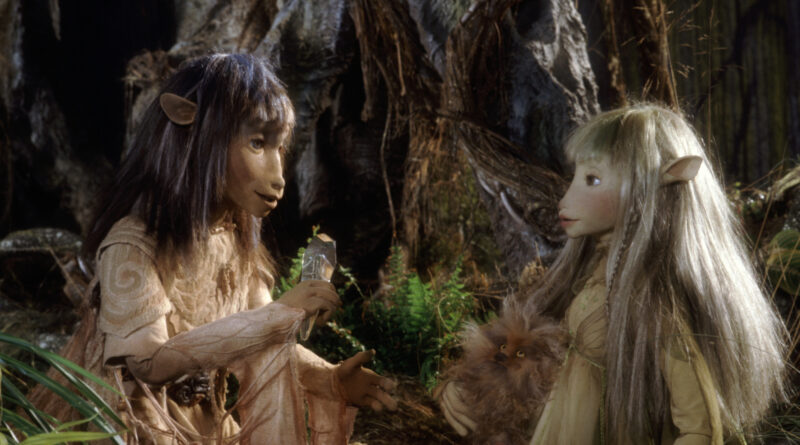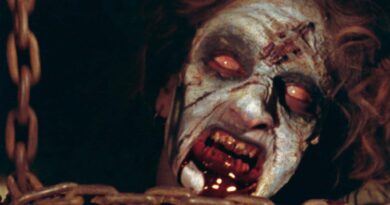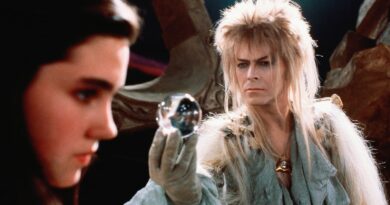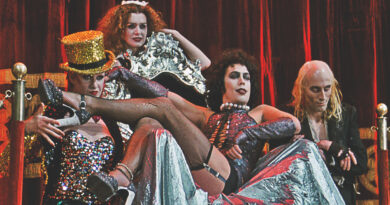The Dark Crystal (1982)
The Dark Crystal shows a very different side of Jim Henson and his team of puppeteers. This isn’t a lightweight Muppet movie about the comedic antics of Kermit the Frog and Fozzie Bear; it’s a fantasy adventure told through the medium of puppetry, and like many fantasies and fairy tales of old, it doesn’t shy away from the frightening or the tragic. Whether or not that makes it “family friendly” is something only parents can determine. I’ll just say that the history of children’s narrative tradition is replete with characters that are creepy and situations that are upsetting. Look at Hansel and Gretel, or Snow White, or Little Red Riding Hood. Even The Wonderful Wizard of Oz, with the threat of the Wicked Witch of the West hanging over little Dorothy Gale, has been enough to scare the youngsters.
If there’s a flaw to be found in The Dark Crystal, it’s that it’s too comfortable within the confines of its genre. It follows a formula, a reluctant hero on a perilous quest to save the world, and it has the usual grab bag of character archetypes – the wise elders, the cruel villains, the female sidekick, the eccentric oracle full of ancient secrets and murky advice, the comedy relief – none of whom are developed beyond the ways in which we expect. Narratively speaking, it doesn’t think outside the box. It even goes to the extent of excessive exposition, a surprising amount of which is given via the internal monologues of the reluctant hero. Sometimes, too much explaining can be just as damaging as not explaining enough.
On the other hand, lack of originality doesn’t automatically make a story unsuccessful. Hackneyed though it was, I nevertheless found the story absorbing and entertaining. Set in “another world, another time, in the age of wonder,” it tells of an orphaned elf-like creature named Jen (performed by Henson, voiced by Stephen Garlick) who has been prophesied to heal a magical cracked crystal and restore balance to the world. Along the way, Jen will encounter a female counterpart, Kira (performed by Kathryn Mullen, voiced by Lisa Maxwell), who has also been orphaned, and a crabby astronomer (performed by Frank Oz, voiced by Billie Whitelaw) who can take her one eye out of her head and use it to see in hard-to-reach areas.
Jen and Kira were raised in different clans by different creatures. In Jen’s case, he was raised by peaceful, vaguely Buddhist-like hunched beings called Mystics, who each have four arms and long scribed snouts. Jen and Kira join forces against their common enemy, the evil Skeksis, disgusting creatures with vulture-like beaked heads and gnarled skeletal hands. Their twisted bodies covered by layers of overly regal garments, they draw life energy from the title crystal. They also drain the life essence out of Kira’s squat adopted people, turning them into white-eyed, mentally-vacant zombie slaves. The Skeksis eagerly await the moment their world’s three suns will converge, guaranteeing them immortality. That’s assuming, of course, that the prophecy of Jen healing the crystal before that moment doesn’t come to pass.
Strangely, there isn’t much mystery to the crystal itself, and the necessary steps Jen must take to heal it are surprisingly easy. Only one shard broke away from the crystal, and for Jen, this shard isn’t found so much as given to him – poured out of a plainly visible box containing several other shards from God knows how many other crystals this fantasy world has. If the shard of the Dark Crystal is so important, so vital to the order of the universe, shouldn’t it be in a less prominent place and much harder to find? Wouldn’t the Skeksis have some knowledge of it, given that this mythical land is repeatedly pillaged by their hulking crab-like guards? I suppose I’m just nitpicking here, but the way I see it, there should be more at stake when it comes to a hero’s journey.
Having said all that, the film’s final scene, which I will obviously not describe in detail, made thought-provoking observations about the nature of duality. Hints are dropped all throughout, some less subtle than others, but it isn’t until the final scene that all is made clear. Whether or not it’s the most appropriate or satisfying of endings is entirely dependent on your narrative preferences. It’s not a question of resolution, but of the way fantasy stories are typically constructed; The Dark Crystal, even with its darker overtones, is narratively simplified to the point that it’s easy to predict key events, and that may bother the audiences that prefer a bit more subtlety. For my money, I thought the ending was just fine. Take from that what you will.




